Join Raddatz, DeHaven and Al Holland for Night of Autism Awareness
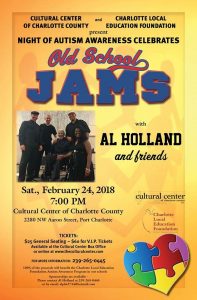 Al Holland is a regular at T.G.I.M. screenings and Fort Myers Film Festival events. Those who’ve spent time with him there or other places know that autism awareness is a cause near and dear to his heart. He participates annually in the Night of Autism Awareness at the Charlotte Cultural Center, and that’s where you’ll find him on Saturday, February 24. That’s the date for this year’s Night of Autism Awareness with Al Holland and Friends. They invade the Cultural Center of Charlotte County beginning at 7:00 p.m. to celebrate Old School Jams.
Al Holland is a regular at T.G.I.M. screenings and Fort Myers Film Festival events. Those who’ve spent time with him there or other places know that autism awareness is a cause near and dear to his heart. He participates annually in the Night of Autism Awareness at the Charlotte Cultural Center, and that’s where you’ll find him on Saturday, February 24. That’s the date for this year’s Night of Autism Awareness with Al Holland and Friends. They invade the Cultural Center of Charlotte County beginning at 7:00 p.m. to celebrate Old School Jams.
Autism spectrum disorder (ASD) is a developmental disability that can cause significant social, communication and behavioral challenges. There is often nothing about how people with ASD look that sets them apart from 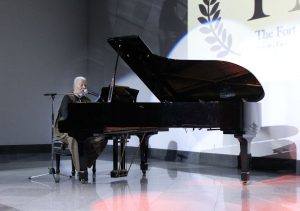 other people, but people with ASD may communicate, interact, behave, and learn in ways that are different from most other people. They might repeat certain behaviors and might not want change in their daily activities. Many people with ASD also have different ways of learning, paying attention, or reacting to things. Signs of ASD begin during early childhood and typically last throughout a
other people, but people with ASD may communicate, interact, behave, and learn in ways that are different from most other people. They might repeat certain behaviors and might not want change in their daily activities. Many people with ASD also have different ways of learning, paying attention, or reacting to things. Signs of ASD begin during early childhood and typically last throughout a 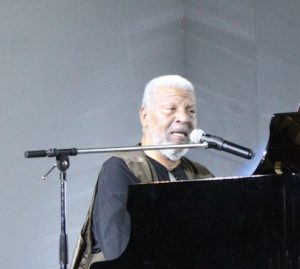 person’s life.
person’s life.
According to the Centers for Disease Control and Prevention, children or adults with ASD might:
- not point at objects to show interest (for example, not point at an airplane flying over)
- not look at objects when another person points at them
- have trouble relating to others or not have an interest in other people at all
- avoid eye contact and want to be alone
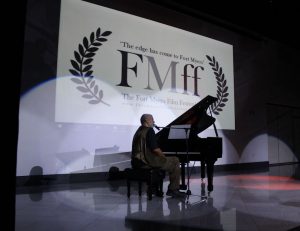 have trouble understanding other people’s feelings or talking about their own feelings
have trouble understanding other people’s feelings or talking about their own feelings- prefer not to be held or cuddled, or might cuddle only when they want to
- appear to be unaware when people talk to them, but respond to other sounds
- be very interested in people, but not know how to talk, play, or relate to them
- repeat or echo words or phrases said to them, or repeat words or phrases in place of normal
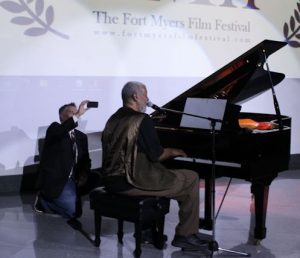 language
language - have trouble expressing their needs using typical words or motions
- not play “pretend” games (for example, not pretend to “feed” a doll)
- repeat actions over and over again
- have trouble adapting when a routine changes
- have unusual reactions to the way things smell, taste, look, feel, or sound
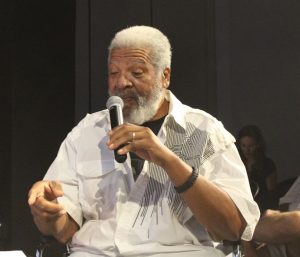 lose skills they once had (for example, stop saying words they were using)
lose skills they once had (for example, stop saying words they were using)
The learning, thinking, and problem-solving abilities of people with ASD can range from gifted to severely challenged. Some people with ASD need a lot of help in their daily lives; others need less. Diagnosing ASD can be difficult since there is no medical test, like a blood test, to diagnose the disorder. Doctors look at the child’s behavior and development to make a diagnosis. 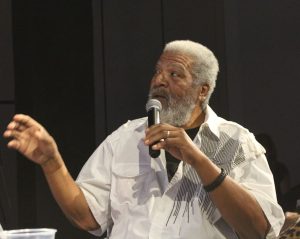 ASD can sometimes be detected at 18 months or younger. By age 2, a diagnosis by an experienced professional can be considered very reliable. However, many children do not receive a final diagnosis until much older. This delay means that children with ASD might not get the early help they need.
ASD can sometimes be detected at 18 months or younger. By age 2, a diagnosis by an experienced professional can be considered very reliable. However, many children do not receive a final diagnosis until much older. This delay means that children with ASD might not get the early help they need.
Holland’s involvement with the Night of Autism Awareness dates 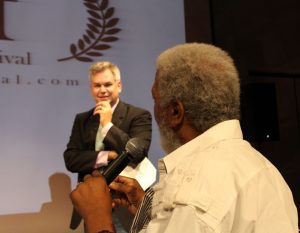 back to 2013, when the event helped fund a sensory room at Kingsway Elementary School through his connection with the Charlotte Local Education Foundation, or CLEF, the fundraising arm of Charlotte public schools.
back to 2013, when the event helped fund a sensory room at Kingsway Elementary School through his connection with the Charlotte Local Education Foundation, or CLEF, the fundraising arm of Charlotte public schools.
The event has evolved since the inaugural concert. The 2014 and 2015 concerts featured the themes of Motown and music from the ’60s and ’70s. 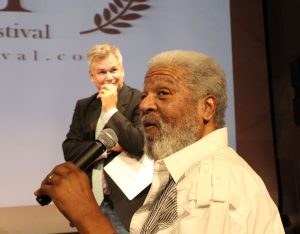 Last year’s theme was “Dancing through the Decades.”
Last year’s theme was “Dancing through the Decades.”
FMff host Eric Raddatz served as master of ceremonies last year and Matlacha Island artist and Bealls apparel fashionista Leoma Lovegrove donated a themed piece for the auction held in conjunction with the concert. All proceeds went to CLEF to fund sensory spaces in schools that school district budgets could not otherwise afford.
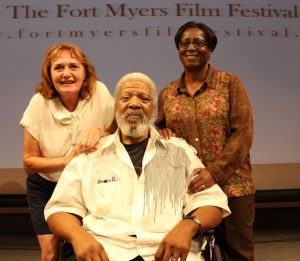 As the event has evolved, so has the understanding about the need. “Now we know about kids on the spectrum. We don’t know the cause, but we know the kinds of therapies they need to get through the day,” Holland told Charlotte County Florida Weekly writer Kathy Grey at last year’s event. “Kids today are able to enjoy fuller lives because of what we’ve done in the last [four] years. But there’s still more to be done.”
As the event has evolved, so has the understanding about the need. “Now we know about kids on the spectrum. We don’t know the cause, but we know the kinds of therapies they need to get through the day,” Holland told Charlotte County Florida Weekly writer Kathy Grey at last year’s event. “Kids today are able to enjoy fuller lives because of what we’ve done in the last [four] years. But there’s still more to be done.”
In 2003, 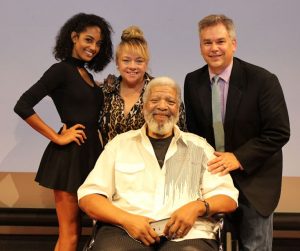 autism was diagnosed in one in 166 children. In 2015, the Centers for Disease Control’s Autism and Developmental Disabilities Monitoring Network reported that autism affects one in 68 children — and one in 42 boys.
autism was diagnosed in one in 166 children. In 2015, the Centers for Disease Control’s Autism and Developmental Disabilities Monitoring Network reported that autism affects one in 68 children — and one in 42 boys.
“Now the Centers for Disease Control and Prevention estimates that 1 in 58 children (or 14.7 per 1,000 eight-year-olds) in multiple communities in the United States, Al updates his friends in a recent 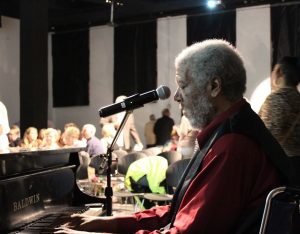 Facebook post promoting the February 24 event. “This new estimate is roughly 30 percent higher than previous estimates reported in 2012 of 1 in 88 (11.3 per 1,000 eight-year-olds).”
Facebook post promoting the February 24 event. “This new estimate is roughly 30 percent higher than previous estimates reported in 2012 of 1 in 88 (11.3 per 1,000 eight-year-olds).”
“Our goal this year is to repair, replace and refurbish existing equipment in the rooms, starting at Port Charlotte Middle School, but it can’t be done without you,” Al amplifies. 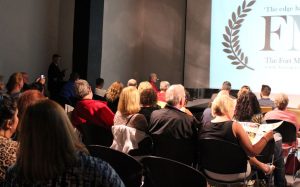 “Your sponsorship is important to our cause. Please join us because we need you to be a part of this community movement. If you have a love of kids, you should have a love of this.”
“Your sponsorship is important to our cause. Please join us because we need you to be a part of this community movement. If you have a love of kids, you should have a love of this.”
Holland is perhaps best known for the time he spent as a keyboard player and vocalist with The Platters, a 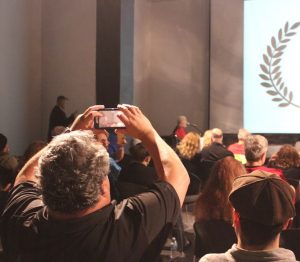 group that rose to prominence in 1955 and was responsible for such hits as The Great Pretender, Only You (And You Alone), My Prayer and Smoke Gets In Your Eyes.
group that rose to prominence in 1955 and was responsible for such hits as The Great Pretender, Only You (And You Alone), My Prayer and Smoke Gets In Your Eyes.
A Detroit native, Holland has been involved with music all of his life. What choice did he have as the son of a music teacher? After years of violin lessons, Holland discovered the cello and became so proficient on the instrument that he played with the 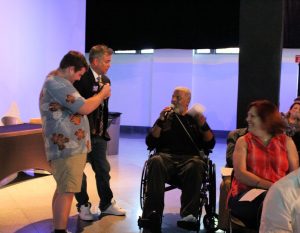 Detroit Symphony Orchestra and the Chicago Symphony Civic Orchestra. But a move to Oklahoma in the 1980s shook things up for “Big Al.” There, he began playing pop music in local night clubs and provided vocals for several groups before joining Attraction following his return to Detroit.
Detroit Symphony Orchestra and the Chicago Symphony Civic Orchestra. But a move to Oklahoma in the 1980s shook things up for “Big Al.” There, he began playing pop music in local night clubs and provided vocals for several groups before joining Attraction following his return to Detroit.
In the early ‘90s, Attraction was invited to open for The Platters. That’s 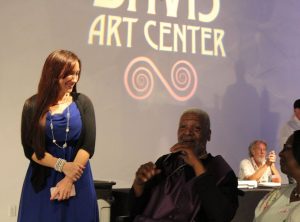 where he was “discovered” by legendary founder Monroe Powell. Powell invited both Verceal Whitaker and Holland to join The Platters. Holland’s tenure with the group lasted from 1992 until 2002 and provided him with “the turning point” in his career as an entertainer.
where he was “discovered” by legendary founder Monroe Powell. Powell invited both Verceal Whitaker and Holland to join The Platters. Holland’s tenure with the group lasted from 1992 until 2002 and provided him with “the turning point” in his career as an entertainer.
Holland has shared the stage with the likes of The Drifters, The Coasters, The Supremes and Frankie Valle and the Four Seasons. 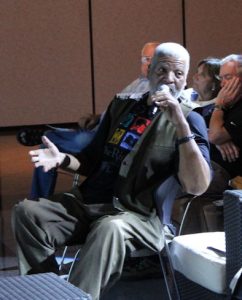 Over the years, Al performed in the United States, Canada, Japan, the Philippines and Australia. But he reached a point where he lost his love of the road, and he settled into a more sedate life in Punta Gorda, where he’s become a Southwest Florida legend, delighting audiences in Lee and Charlotte counties with his oldies, rhythm and blues, and Motown sounds.
Over the years, Al performed in the United States, Canada, Japan, the Philippines and Australia. But he reached a point where he lost his love of the road, and he settled into a more sedate life in Punta Gorda, where he’s become a Southwest Florida legend, delighting audiences in Lee and Charlotte counties with his oldies, rhythm and blues, and Motown sounds.
And playing with the Charlotte Symphony Orchestra.
Al would certainly like everyone to turn out for the next Night of Autism Awareness.
This 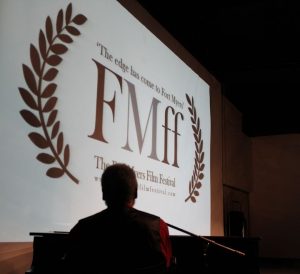 year’s event will be co-hosted by Eric Raddatz and Melissa DeHaven, and will include a special performance including world-renowned keyboardist Tim Goodman that’s directed by Kathleen Candales of Higher Ground Performing Arts. Tickets are $60. VIP tickets include a pre-show cocktail hour with hors d’oeuvres and open bar.
year’s event will be co-hosted by Eric Raddatz and Melissa DeHaven, and will include a special performance including world-renowned keyboardist Tim Goodman that’s directed by Kathleen Candales of Higher Ground Performing Arts. Tickets are $60. VIP tickets include a pre-show cocktail hour with hors d’oeuvres and open bar.
Follow Al on Facebook for more details.
January 21, 2018.
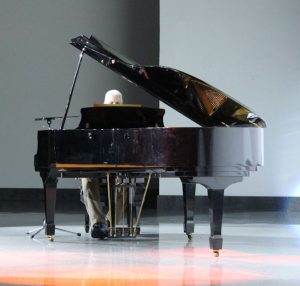 RELATED LINKS.
RELATED LINKS.
- T.G.I.M. returns New Year’s Day
- Meet January T.G.I.M. celebrity judge Darrell Nutt
- Meet January T.G.I.M. celebrity judge Kinfay Moroti
- Meet January T.G.I.M. celebrity judge Joseph Pearson
- Singer-songwriter Gabrielle MacAfee celebrates T.G.I.M. on New Year’s Day
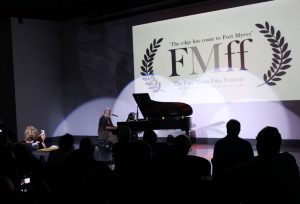 If you missed December’s T.G.I.M., you missed world premiere of Cornell Bunting’s first indie film
If you missed December’s T.G.I.M., you missed world premiere of Cornell Bunting’s first indie film- Poignant, timely, ‘NOA’ a film you’ll think about tomorrow and the day after
- T.G.I.M. returns December 4
- Mega-talent Rachel Burttram Powers to judge December 4 T.G.I.M.
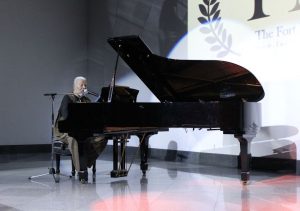 Emmy-winning videographer Ilene Safron celeb judge at December 4 T.G.I.M.
Emmy-winning videographer Ilene Safron celeb judge at December 4 T.G.I.M.- Meet December T.G.I.M. celebrity judge Tom Conwell
- LYR and Young Dead’s Angela Pane perfect Intellectualization Monday fit
- T.G.I.M. returns November 6
- Meet November T.G.I.M. celebrity judge Char Loomis
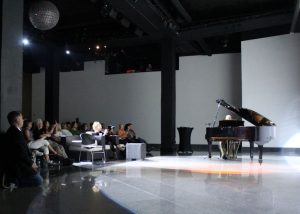 Meet November T.G.I.M. celebrity judge John Davis
Meet November T.G.I.M. celebrity judge John Davis- Meet November T.G.I.M. celebrity judge Brad Cozza
- Emma Arnold provides fresh indie sound at November’s T.G.I.M.
- ‘Women Stand Together’ reveals gender bias as impediment to meaningful conversation
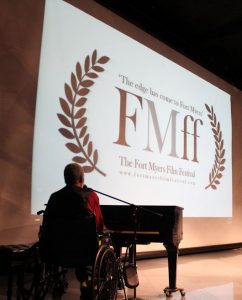 T.G.I.M. returns October 2
T.G.I.M. returns October 2- Meet October T.G.I.M. celebrity judge Dakota Jordan Peoples
- Meet October T.G.I.M. celebrity judge Stephanie Davis
- Meet October T.G.I.M. celebrity entertainer Al Holland
- T.G.I.M. audiences focus on meaning and message of indie films
- Elijah Green theme song encapsulates anticipation of T.G.I.M. screenings
- T.G.I.M. returns to Davis Art Center on Labor Day
- Mayor Randy Henderson to provide opening remarks at Sept. 4 T.G.I.M.
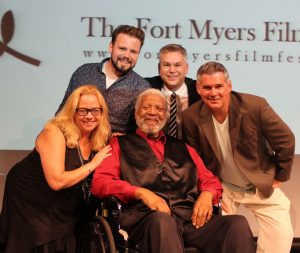 John Scoular one of T.G.I.M. celebrity judges on September 4
John Scoular one of T.G.I.M. celebrity judges on September 4- Actor/director Stella Zuri joins Sept. 4 T.G.I.M. celebrity judge panel
- Freakshow’s Flyin Brian to provide blunt assessments at T.G.I.M.
- Singer-songwriter Chloe Friedman will perform at September 4 T.G.I.M.
- T.G.I.M. returns to Davis Art Center on August 7
- Filmmaker Tyler Shore sharing judging duties at
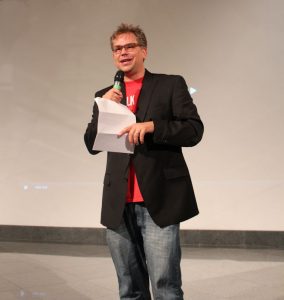 August 7 T.G.I.M.
August 7 T.G.I.M. - Actress and model Mercedes Gutierrez one of August’s T.G.I.M. celebrity judges
- Jason Parrish one of T.G.I.M. celeb judges for August
- Frankie Colt returns to Davis Art Center for T.G.I.M.
- About the 8th Annual Fort Myers Film Festival














 Tom Hall is both an amateur artist and aspiring novelist who writes art quest thrillers. He is in the final stages of completing his debut novel titled "Art Detective," a story that fictionalizes the discovery of the fabled billion-dollar Impressionist collection of Parisian art dealer Josse Bernheim-Jeune, thought by many to have perished during World War II when the collection's hiding place, Castle de Rastignac in southern France, was destroyed by the Wehrmacht in reprisal for attacks made by members of the Resistance operating in the area. A former tax attorney, Tom holds a bachelor's degree as well as both a juris doctorate and masters of laws in taxation from the University of Florida. Tom lives in Estero, Florida with his fiancee, Connie, and their four cats.
Tom Hall is both an amateur artist and aspiring novelist who writes art quest thrillers. He is in the final stages of completing his debut novel titled "Art Detective," a story that fictionalizes the discovery of the fabled billion-dollar Impressionist collection of Parisian art dealer Josse Bernheim-Jeune, thought by many to have perished during World War II when the collection's hiding place, Castle de Rastignac in southern France, was destroyed by the Wehrmacht in reprisal for attacks made by members of the Resistance operating in the area. A former tax attorney, Tom holds a bachelor's degree as well as both a juris doctorate and masters of laws in taxation from the University of Florida. Tom lives in Estero, Florida with his fiancee, Connie, and their four cats.